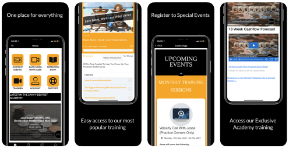Psychology is the study of behaviour. It helps inform us of why we make the choices we make. When we have a little insight into psychology, it can help us set up situations that are beneficial to our patients and to our bottom line. In short, it can be a game changer.
As clinicians, we can all appreciate hard science. And these tips gleaned from psychology research are science. They’re tested, reproducible, and learnable. Even though it taps into the reasons why we make the choices we make, psychology often isn’t intuitive.
Taking the time to learn the reasons ‘why’ behind choices your patients make can help you become a better dentist and a better businessperson. These are three easy tips you can implement right now that can have a huge impact on your practice.
Technique 1: Reduce cancellations by getting the right commitment.
Asking for a follow-up appointment or next checkup is great. But if you’re getting missed and canceled appointments you need to polish up the commitment from your patients.
Creating a low cancellation percentage begins with getting the right kind of commitment from your patients. This commitment has three parts to it:
- The commitment should be voluntary and not feel directed by you.
- The commitment should be active.
- The commitment is public.
So whenever you want to ask for a commitment from a patient offer them two options. Would you like this procedure or that one? Would you like to come in next week or the week after? If you only present one option, then your patient cannot voluntarily commit to it and will feel like it’s your decision and not their own. They won’t own it!
Next, you want to encourage your patient to actively commit. This means putting it on their calendar, on their phone, or at least say it out loud to you. Let them write it on a card in reception instead of you writing it down for them.
The more people who know about a commitment, the less likely a person is to cancel it. When you’re running a marathon, this might mean telling all your friends and family. In a dental practice, it usually means saying something like, “Will you please call me if you need to cancel or reschedule?” Once they say yes, you can add, “Great. I’ll let the member of my team know that you will call if you’re not going to make it.”
Finally, try asking at the end of the conversation, “Oh, I am sorry, what was the date of your appointment? I want to make sure we’re on the same page.” What does it tell you if they cannot repeat back the date and time of their appointment? They haven’t committed. It’s better to know now than on the morning of the appointment.
“You are just putting them in a box that they’ve now…And now they’re gonna act in accordance with what box they’ve put themselves in.” —Dr. Jesse Green.
Technique 2: Create active patients with the right mindset.
Helping patients attain an active mindset in regard to their dental health will help the process of ongoing dental care smoother. Creating a mindset for your patients to say ‘yes!’ to treatment is something you can do before they even see you.
Proactive patients are those that don’t want their dental health to deteriorate. They want preventive care rather than extensive treatment later on.
To create patients with this mindset, you can create a new question on your patient intake form.
“When it comes to your oral health, do you prefer to be proactive or reactive?”
Once again, you are giving your patient a choice so they can freely commit to being proactive. Do you want to be proactive means they want to avoid pain, discomfort, and more money down the road. If a patient prefers to be reactive, it means they are saying the prefer to let the wheels fall off the bus even if it costs them more time, discomfort, and money later.
Technique 3: Use contrasts to soften the blow of expensive dental procedures.
People will spend money on the things they want. Most people will only spend money on the things they need when it’s a crisis situation. The key to selling more expensive dental procedures is to turn your services into a want. You can do this by using contrasts.
Let’s use a crown as an example. If you don’t present a contrasting situation, your patient will create them the distinction without your help. If you tell them, “A crown is $1,200,” they will start thinking, “Geez, my mortgage isn’t that much. My car payment isn’t that much. I can’t afford this.” They will mentally shut down and the conversation is over before it really begins.
Start the conversation with your patient by saying, “Here’s your decay. If we do nothing and it gets any deeper than this, it’s going to get to the nerve. It’s probably going to cause an infection and it’s going to cause pain. It might take a couple of visits to fix. You will have to go to a specialist. So, if we wait, we’re looking at a $3,600 or more bills.” Immediately they will start the, “Geez, I can’t afford that” thought process.
But that is perfect because now is your chance to offer them a second option (remember: always offer two options so your patients are freely committing).
“The good news is that we’re not there yet. Option two is if we get to it today, you just need a crown. That’s only $1,200. And after insurance, it’s only $800 and we can do that in two payments so you only need to do $400 this month and $400 next month.”
With this approach, you’re stair-stepping down from the initial cost of $3,600 to just $400. This is also known as down selling. It can be incredibly effective to motivate patients to prioritise their dental care now before it becomes a bigger – and much more expensive – oral health problem in the future.
Final Words…
Psychology is a powerful tool. Simply rephrasing the way you ask a question can assist you with developing a patient’s understanding of their treatment choices and making commitments to achieve their best oral health outcomes.
P.S. Whenever you’re ready …. here are 4 ways I can help you grow your dental practice:
- Grab a free chapter from my book “Retention – How to Plug the #1 Profit Leak in Your Dental Practice”
The book is the definitive guide to patient retention and how to use internal marketing to grow your practice – Click Here
- Join the Savvy Dentist community and connect with dentists who are scaling their practice too
It’s our Facebook group where clever dentists learn to become commercially smart so that they have more patients, more profit and less stress. – Click Here
- Attend a Practice Max Intensive live event
Our 2 day immersive events provide access to the latest entrepreneurial thinking and actionable strategies to drive your practice forward. You’ll leave with a game plan to take your results to the next level. If you’d like to join us, just send me a message with the word “Evou’d like to work directly with me and my team to take your profit from 6 figures to 7 figures …. just send me a message with the word “Private”… tell me a little about your practice and what you would like to work on together, and I’ll get you all the details! – Click here





